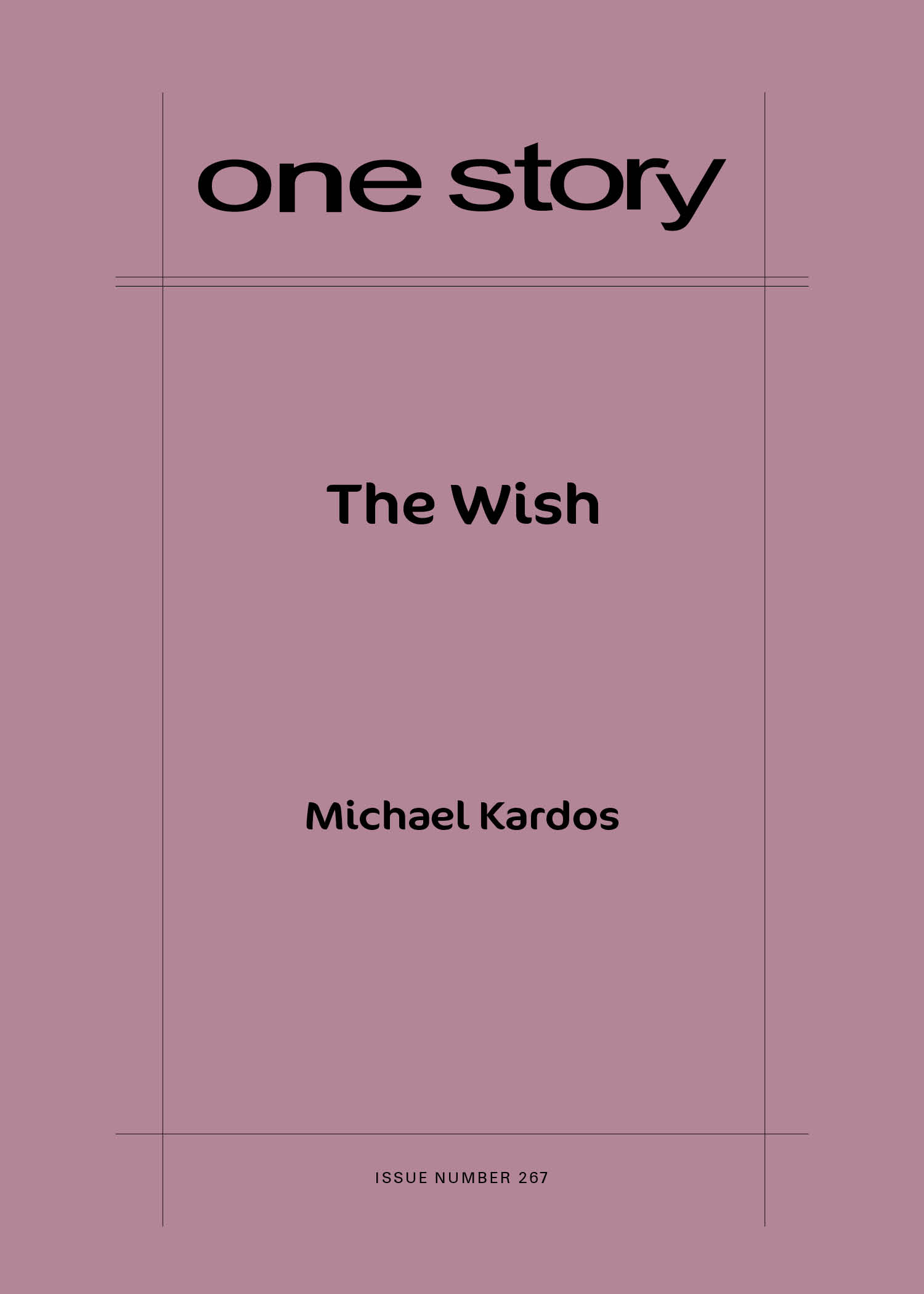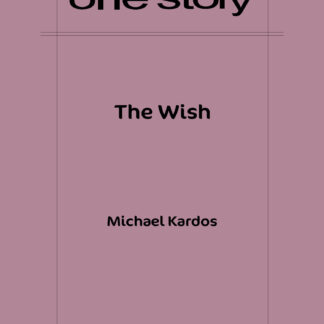
The Wish
$2.50
164 in stock
Excerpt
I’ve never been hit in the face, and neither have you. That was my thought, reading the poetry manuscript submitted by this writer and endowed professor of English with the mile-long CV.
In the opening poem, the speaker is punched by his next door neighbor over the matter of dead tree limbs and who bore the responsibility for their removal. This got me thinking about all the people in books and movies and on TV who get punched in the face, and how this had never happened to me or to anyone I knew, except for one friend in college who, walking down the street, was sucker-punched by a man dressed in rags and muttering nonsense and probably flying on some drug or another. A cop saw it happen. The arrest took two seconds. In court several months later, the man looked sober, well-groomed, with a suit on. My friend couldn’t even say for sure if it was the same guy. He wasn’t after retribution anyway, my friend. The punch hadn’t fully connected and had only turned his lip purple and loosened one tooth that tightened again on its own within the week.
Michael Kardos
Michael Kardos is the author of the novels Bluff, Before He Finds Her, and The Three-Day Affair, the story collection One Last Good Time, and the craft book The Art and Craft of Fiction: A Writer’s Guide. His short fiction has appeared in Crazyhorse, The Southern Review, and Pleiades, among others, and has won a Pushcart Prize. He grew up on the Jersey Shore and now teaches at Mississippi State University, where he co-directs the creative writing program.
Patrick Ryan on “The Wish”
“I’ve never been hit in the face, and neither have you.” So begins our new issue, “The Wish.” It’s a great first sentence, a great hook, because not only do we not know who’s speaking; we don’t know who they’re speaking to. (Are you talking to me?) And the authority in those eleven words! Soon enough, it’s revealed that the speaker is Sean, a poetry editor at a small publishing house who places a high value on authenticity and wants to do right by his authors. He also wants to do right by someone he’s recently lost. When a manuscript comes across his desk, sent by the poet’s mother, Sean sees an opportunity to do some good in a world that, for him, has been particularly bad lately.
In general, I’m usually not drawn to short stories, novels, and films about writers or editors or the publishing business. Not because I don’t think those are worthy subjects, but because I usually don’t find them very compelling. There’s a reason why films about writers often don’t devote a lot of footage to the main characters actually writing: it’s boring to watch someone write. (It’s also boring to watch someone edit.) By that same token, get any six authors together at a dinner table and chances are the subject of writing won’t even come up. Who wants to talk about how they spent their morning moving words around? So I was guarded when I began reading “The Wish” and realized it was about an editor. But that first sentence had me, and soon the voice had me, and soon I’d read right to the end and wanted to start the story all over again.
Michael Kardos is a tremendous talent. In his hands, “The Wish” isn’t about an editor or about the publishing industry or about any aspect of the writing process. It’s a story about a damaged person who’s trying, simultaneously, both to heal and to do the right thing. We’re thrilled to be ushering it into the world, and we hope you enjoy it as much as we did. After you read the story, be sure to check out my Q&A with Michael, wherein he reveals which character showed up on the page unexpectedly and explains why he thinks of “The Wish” as a “yo-yo story.” (Note: There are no yo-yos in “The Wish.”)
Q&A by Patrick Ryan
- PR: Where did the idea for this story come from?
- MK: I’m a sucker for an interesting premise. That’s where the energy for my stories often starts, as opposed to with a character or a setting or an image. Before long, I’m thinking about all those other elements. But if a premise grabs me—makes me feel like I’m carrying around a good secret—there’s a better chance I’ll stick with the story for the long haul (and for me, finishing a story is often a long haul). The idea for “The Wish” came to me several years ago, but for a long time I wasn’t able to figure out how to write it.
- PR: What was the most challenging aspect of writing this story?
- MK: I started writing “The Wish” not so long after my mother’s death from a long illness, and I found it impossible to work on it without considering those last weeks.
- PR: Were there any surprises during the writing? Another way I sometimes ask this question is, how different is the finished story from the one you originally set out to write?
- MK: Although I don’t recall my idea for the story changing radically as I worked on it, there were any number of small surprises, like the brief scene between Sean and Emma’s father. I didn’t even know there’d be a father in the story until, suddenly, there he was.
- PR: Without giving anything away, I noticed that “The Wish” begins with Sean’s expressing a note of doubt about a claim an author has made, and yet the story that follows is, in part, about his not doubting the very next author he intends to work with. Was that unconscious on your part, or intentional?
- MK: For me, this story is interested in what writing can, and can’t, achieve for its author and for a reader. I didn’t consciously plan the opening paragraphs to illustrate what you point out, but I think I must have felt it made sense to begin with Sean considering authenticity and honesty, both of which are fundamental to his life as an editor and a grieving person.
- PR: You do a wonderful job of integrating the two worlds of the story—Sean’s present, and his recent past. It’s like a balancing act you maintain to the end. Were you at all tempted to show us more of Rose? Specifically, more pre-illness Rose?
- MK: Thanks. Many aspects of this story were hard to write, but strangely the balance between past and present wasn’t too much of a struggle. When the story opens, he seems to have his life pretty much together, but we quickly learn that he’s still actively grieving. I wanted to keep the story rooted in the present, but I also tried to stay attuned to moments when Sean would reflect on his recent past with Rose.
- PR: How long did it take you to complete this story?
- MK: Speaking of struggling: writing “The Wish” took three years. I came up with the premise and wrote the first couple of pages and then got royally stuck. For a couple of years, I’d open the file every so often, start reading, and remember why I’d been intrigued to write it. Then I’d get stuck all over again and remember why I put it away. We need a name for that. A yo-yo story? Anyway, one day I was between other things and opened the file yet again, and for whatever reason I was able to see the story better and stick with it until I had a draft.
- PR: What are you working on now?
- MK: In theory, some long things, some short things. With two kids at home, Pandemic Mike’s schedule is not currently a model of productivity.
- PR: What is the best bit of advice about writing you have ever received?
- MK: If it feels too much like work, it’s a sign that something’s not going right. Even writing the hard, painful stuff, on some level, has to feel like play—like you’re getting away with something.
